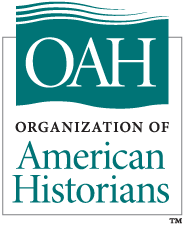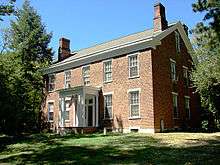Organization of American Historians

The Organization of American Historians (OAH), formerly known as the Mississippi Valley Historical Association, is the largest professional society dedicated to the teaching and study of American history. OAH's members in the U.S. and abroad include college and university professors; historians, students; precollegiate teachers; archivists, museum curators, and other public historians; and a variety of scholars employed in government and the private sector. The OAH publishes the Journal of American History. Among its various programs, OAH conducts an annual meeting[1] each spring, and has a robust roster on its OAH Distinguished Lecturership Program.[2]
The organization's mission is to promote excellence in the scholarship, teaching, and presentation of American history, and encourage wide discussion of historical questions and equitable treatment of all practitioners of history. Membership is open to all who wish to support its mission.
In 2010 its individual membership is approximately 8,000 and its institutional membership approximately 1,250. For its 2009 fiscal year ending June 30, 2009, the organization's operating budget was approximately $2.9 million[3]
Headquarters
The organization's headquarters are in Bloomington, Indiana on the campus of Indiana University in the Raintree House (also referred to as the Millen-Stallknecht House, #105-055-80021 in City of Bloomington Historic Sites and Structures Inventory). The Raintree House is a Greek Revival style brick house. The house gets its name from two large raintrees (Koelreuteria paniculata), which stand on the property. Built by William Moffett Millen c. 1845, it is an excellent example of the Georgian house plan favored by well-to-do farmers in southern Indiana and the Upland South in the mid-nineteenth century.[4]

History and background
The Mississippi Valley Historical Association was formed on October 17 and 18, 1907 at a meeting in Lincoln, Nebraska, of seven historical societies of the Mississippi Valley. The organization, devoted to studying the Mississippi Valley region, began a tradition of holding an annual meeting each year, and began quarterly publication in 1914 of the Mississippi Valley Historical Review. As the scholarly emphasis of the organization and its journal developed and spread over time, its initial emphasis on the Mississippi Valley waned, in favor of an approach focusing more broadly on the United States. In recognition of this, and of the publication of the fiftieth volume of the Mississippi Valley Historical Review, the name of the journal was changed to the Journal of American History and the organization, correspondingly, and by approval of the voting majority of its membership through a mail ballot,[5] was rechristened on Friday, April 23, 1965 as the Organization of American Historians.[6]
Indiana University was selected as home for the editorial offices of the Mississippi Valley Historical Review predecessor to the Journal of American History in 1963.[7] Prior to relocating to Indiana, the editorial offices were located at Tulane University. The organization moved its business offices to Indiana in the summer of 1970 from its home on the campus of the University of Utah in Salt Lake City, Utah.
The OAH was admitted to the American Council of Learned Societies in 1971. It is a foundational partner of the National Coalition for History, the National Humanities Alliance, and National History Day.
Information about OAH governance, officers, and its committee structure is available at http://www.oah.org/about/
OAH Annual Meetings
Each year since its founding, the Organization of American Historians holds its annual meeting in a city in the United States. The OAH met during the following years in these cities and venues in the United States.
|
List of OAH Presidents
|
|
|
OAH Awards and Prizes
The following is a list of Awards and Prizes given by Organization of American Historians.[8]
- Willi Paul Adams Award
- Erik Barnouw Award
- Ray Allen Billington Prize
- Binkley-Stephenson Award
- Avery O. Craven Award
- Merle Curti Award
- Friend of History Award
- Ellis W. Hawley Prize
- OAH-IEHS John Higham Travel Grants
- Darlene Clark Hine Award
- Huggins-Quarles Award
- Richard W. Leopold Prize
- Lerner-Scott Dissertation Prize
- Lawrence W. Levine Prize
- Liberty Legacy Foundation Award
- Samuel and Marion Merrill Graduate Student Travel Grants
- David Montgomery Award
- Louis Pelzer Memorial Award
- James A. Rawley Prize
- Roy Rosenzweig Distinguished Service Award
- Tachau Teacher of the Year Award
- David Thelen Award
- Frederick Jackson Turner Award
References
- ↑ annual meeting
- ↑ OAH Distinguished Lecturership Program
- ↑ "OAH Treasurer’s Report, Fiscal Year, 2009", Robert Griffith, OAH Treasurer, February 8, 2010 http://www.oah.org/publications/reports/treasurer09.pdf
- ↑ Katherine Roberts, Description and History of Indiana University's Raintree House for Nomination of the Property to the National Register of Historic Places, March, 2003, p 1.
- ↑ Official Notice to Members of the Mississippi Valley Historical Association, Journal of American History, Vol. 51, No. 2 (Sep., 1964), pp. 351-352.
- ↑ William D. Aeschbacher, "The Mississippi Valley Historical Association, 1907-1965", Journal of American History, Vol. 54, No. 2 (Sep., 1967), pp. 339-353.
- ↑ Thomas D. Clark, Our Roots Flourished in the Valley, Journal of American History, Vol. 65, No 1 (Jun., 1978), p 102.
- ↑ "OAH Awards and Prizes". The Organization of American Historians: Programs & Resources:. The Organization of American Historians. Retrieved 2013-11-03.
Further reading
- Kirkendall, Richard S., ed. The Organization of American Historians and the Writing and Teaching of American History (2011), essays on the history of the OAH, and on teaching main themes
External links
- OAH website
- OAH Annual Meeting
- Journal of American History website
- OAH Magazine of History website
- OAH Distinguished Lectureship Program
- OAH Archives
- Official OAH Facebook page
- OAH Twitter Feed